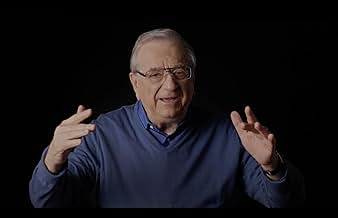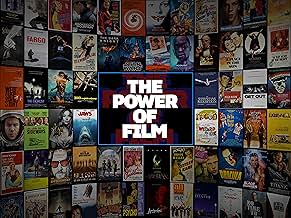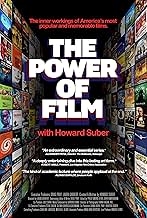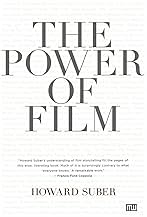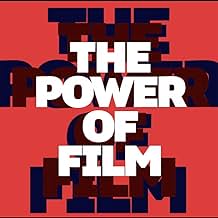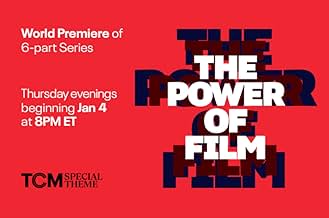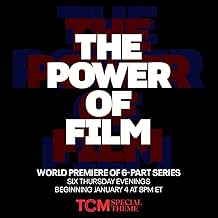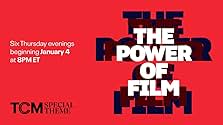Profundiza en el arte de contar historias examinando los principios definitorios y el funcionamiento interno de las películas estadounidenses más populares y memorables de todos los tiempos.Profundiza en el arte de contar historias examinando los principios definitorios y el funcionamiento interno de las películas estadounidenses más populares y memorables de todos los tiempos.Profundiza en el arte de contar historias examinando los principios definitorios y el funcionamiento interno de las películas estadounidenses más populares y memorables de todos los tiempos.
- Reparto principal
Explorar episodios
Reseñas destacadas
This series is designed to teach people about the elements that go into a successful and memorable film. As such, you get to look at (once again) clips from successful and memorable films. Introducing these films is a nice old man who apparently taught this subject to film makers for decades. He's obviously knowledgeable and has a certain charm, but whatever he is trying to communicate gets lost in his many detours and sidetracks.
Occasionally he manages to stay on track, and when he does this, he isn't necessarily correct. At one point (I can't remember where) he talks about the need for surprise and how repetition can be harmful to the film's impact. Nothing could be further from the truth. Repetition is a fundamental aspect of human life. Repetition is a fundamental aspect of human life. Freud wrote about it and called it the "repetition compulsion" and tied it to the basic death drive. It's the core of most comedies and the way in which most action films anticipate a dramatic confrontation. Gun fighters don't meet for the first time. You see them in matches and anticipate what is going to happen in the final match. Substitute gunfighters for chess champions, gymnists, etc. And you see the structure of most effective dramatic scenes.
Not a complete waste of time, and it's always fun to see memorable scenes even if you've seen them hundreds of times. Along the way there are some good observations.
Occasionally he manages to stay on track, and when he does this, he isn't necessarily correct. At one point (I can't remember where) he talks about the need for surprise and how repetition can be harmful to the film's impact. Nothing could be further from the truth. Repetition is a fundamental aspect of human life. Repetition is a fundamental aspect of human life. Freud wrote about it and called it the "repetition compulsion" and tied it to the basic death drive. It's the core of most comedies and the way in which most action films anticipate a dramatic confrontation. Gun fighters don't meet for the first time. You see them in matches and anticipate what is going to happen in the final match. Substitute gunfighters for chess champions, gymnists, etc. And you see the structure of most effective dramatic scenes.
Not a complete waste of time, and it's always fun to see memorable scenes even if you've seen them hundreds of times. Along the way there are some good observations.
"The Power of Film" is an Incredibly succinct, refined, distilled, and evidence-based look at what makes a good story on screen. If I were an inexperienced woodworker, and this series were about saws, after watching it there would not be a lot standing between me and a viable career in carpentry. His analysis reaches back to the foundational achievements of the plays of ancient Greece, but he doesn't start there or end there. He updates them using this era's most memorable films, seamlessly, but starting from today and integrating backward. I learned so much about what makes great, enduring, archetypal comedy/tragedy stories, and then so much more about doing it on screen. Depicted in detail and depth is "What makes a modern immortal film.". I know it will delight writers, directors, and even cinematographers.
Personally, I have been mulling for years on an idea for a Sci-Fi story of novel/screenplay length. The idea is good, I felt, but I was getting nowhere with the execution. I watched "The Power of Film" by coincidence and by episode three I was thinking OMG WTF. The problems I was having were incredibly simple. Obvious, timeless and ubiquitous formulas were absent and when they were spelled out to me I was suddenly, fully deconstipated. I filled half of a tablet about what was really going on in my mind, what was missing. My story had been malformed and stunted by inexperience and lack of tools. You might think: "oh, he abandoned his grand vision in favour of formulaic tripe", but it was the very opposite.
I had tried to achieved a setting, a feeling, a loose plot, a grand vision, but a ton of ambiguity dominated it because of a lack of overarching form...I was lost inside scenes. This series revealed to me what I really wanted to say, and a greater plot emerged that actually made sense. I shared this with a peer and the next day they told me "I've been thinking about your story" and started asking questions about it. I finally had answers.
If you are an aspiring screenwriter or author, and you are stuck...these episodes are capable of un-sticking you. This series is an absolutely must-see for creators and consumers both.
Personally, I have been mulling for years on an idea for a Sci-Fi story of novel/screenplay length. The idea is good, I felt, but I was getting nowhere with the execution. I watched "The Power of Film" by coincidence and by episode three I was thinking OMG WTF. The problems I was having were incredibly simple. Obvious, timeless and ubiquitous formulas were absent and when they were spelled out to me I was suddenly, fully deconstipated. I filled half of a tablet about what was really going on in my mind, what was missing. My story had been malformed and stunted by inexperience and lack of tools. You might think: "oh, he abandoned his grand vision in favour of formulaic tripe", but it was the very opposite.
I had tried to achieved a setting, a feeling, a loose plot, a grand vision, but a ton of ambiguity dominated it because of a lack of overarching form...I was lost inside scenes. This series revealed to me what I really wanted to say, and a greater plot emerged that actually made sense. I shared this with a peer and the next day they told me "I've been thinking about your story" and started asking questions about it. I finally had answers.
If you are an aspiring screenwriter or author, and you are stuck...these episodes are capable of un-sticking you. This series is an absolutely must-see for creators and consumers both.
A collection of movie clips overlaid by narration which is shallow, says pretty much nothing of value and often contradicts itself. The professor will name a "pattern" (usually the vaguest possible theme like "family") and then proceed to illustrate it with examples of movies, hilariously including some, which do not actually feature the stated "pattern" at all.
You are better off watching amateur film montages on youtube, at least they focus on the movies themselves and do not add pretentious, yet meaningless voiceover.
The attempted analysis is very superficial and sometimes almost sounds like a parody. Like this gem of deep thinking: "It was a fatal accident, so it must have something to do with fate". Definitely a fine example of "those who cannot do, teach".
You are better off watching amateur film montages on youtube, at least they focus on the movies themselves and do not add pretentious, yet meaningless voiceover.
The attempted analysis is very superficial and sometimes almost sounds like a parody. Like this gem of deep thinking: "It was a fatal accident, so it must have something to do with fate". Definitely a fine example of "those who cannot do, teach".
I'm adding a review to counter a review from 2/1/24. I won't say that this reviewer's thoughts aren't valid. I just wanted to clarify an issue that may have been overlooked, so others have a clear understanding of what to expect.
In the first episode of the series (as he does in the forward of the book with the same title) Suber states that he is only commenting on a select group of popular and memorable movies, since these are movies that most people have probably seen and remember. They act as exemplars. The goal here isn't to provide insight to a wide range of movies; it is to discuss why we respond to movies so that we can apply those insights to the movies we personally remember best.
Having said that this is a series of lectures, with the professor talking into a interrotron camera rig and with select movie scenes used as illustration. I can see how that might not be entertaining for a lot of people and even though I really liked this, I did zone out from time to time.
Personally, I don't think this is really a series about movies. This is a series about audiences. I think a more apt title might have been The Power of Audiences, but who would watch that:)
In the first episode of the series (as he does in the forward of the book with the same title) Suber states that he is only commenting on a select group of popular and memorable movies, since these are movies that most people have probably seen and remember. They act as exemplars. The goal here isn't to provide insight to a wide range of movies; it is to discuss why we respond to movies so that we can apply those insights to the movies we personally remember best.
Having said that this is a series of lectures, with the professor talking into a interrotron camera rig and with select movie scenes used as illustration. I can see how that might not be entertaining for a lot of people and even though I really liked this, I did zone out from time to time.
Personally, I don't think this is really a series about movies. This is a series about audiences. I think a more apt title might have been The Power of Audiences, but who would watch that:)
Mind-numbingly boring and shallow, Professor Blabbermouth takes us into the world of film with nothing new to say while stating the incredibly obvious. If we only had to rely on what this guy says, I doubt anyone other than his immediate family would make it through this (I dropped out after one episode). There are a million film clips that prop up this bore, but they aren't enough to add up to entertainment. The first episode is completely all over the place and makes not much of a point, and the point made isn't much and hardly warranted forty minutes to tell. He should just write down his point on a 3X5 index card and let viewers watch a real movie.
Selecciones populares
Inicia sesión para calificar y añadir a tu lista para recibir recomendaciones personalizadas
Detalles
- Color
Contribuir a esta página
Sugerir un cambio o añadir el contenido que falta

Principal laguna de datos
By what name was The Power of Film (2024) officially released in India in English?
Responde
